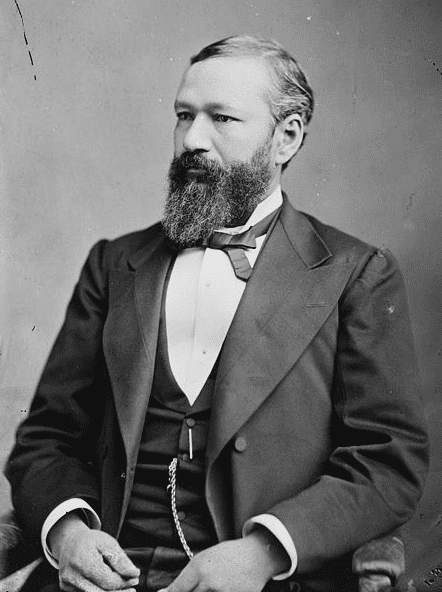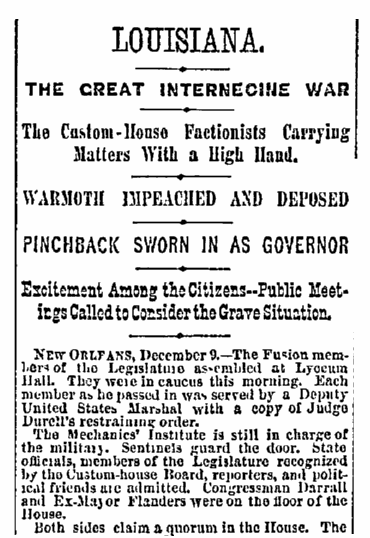Pinckney Benton Stewart Pinchback achieved a political milestone when he became governor of Louisiana on 9 December 1872: the first African American governor in the nation’s history.

He came to office under difficult circumstances, however, and nothing about his 35-day term as governor was easy. Pinchback won election as a Louisiana state senator in 1868. When the lieutenant governor, Oscar Dunn, died in office in 1871, Pinchback – who was president of the state Senate at the time – succeeded him. The next year the governor, Henry Clay Warmoth, was impeached with barely over a month left in his term, and as the acting lieutenant governor Pinchback then succeeded him and served out the rest of Warmoth’s term as Louisiana’s governor.
For the entire 35 days Pinchback served as governor he received hate mail and threats on his life. The country would not have its second African American governor until Douglas Wilder was elected governor of Virginia in 1990.
Louisiana’s political intrigue in 1872, with Warmoth’s impeachment and Pinchback’s ascension to the governor’s chair, was big news around the country. The Cincinnati Daily Enquirer ran this front-page story.

Here is a transcription of this article:
Louisiana
The Great Internecine War
The Custom-House Factionists Carrying Matters with a High Hand
Warmoth Impeached and Deposed
Pinchback Sworn In as Governor
Excitement among the Citizens – Public Meetings Called to Consider the Grave Situation
NEW ORLEANS, December 9. – The Fusion members of the Legislature assembled at Lyceum Hall. They were in caucus this morning. Each member as he passed in was served by a Deputy United States Marshal with a copy of Judge Durell’s restraining order.
The Mechanics’ Institute is still in charge of the military. Sentinels guard the door. State officials, members of the Legislature recognized by the Custom-House Board, reporters, and political friends are admitted. Congressman Darrall and Ex-Mayor Flanders were on the floor of the House.
Both sides claim a quorum in the House. The Senate is doubtful. Vigers, the old Clerk of the House, whose duty it is to call the roll, was arrested yesterday by the Deputy United States Marshal, and has since been held a prisoner at the Mechanics’ Institute. This move was made to prevent him calling the roll of the Conservative House.
In the Federal Court the Warmoth contempt case was postponed until tomorrow, on account of the illness of Judge Durell.
Much interest is manifested regarding political moves. Quite a crowd gathered at the Mechanics’ Institute, where the Kellogg Legislature met, and City Hall, where the Fusion members were in caucus, as well as at the Federal Court Room, where the Warmoth contempt case was set for hearing.
Judge Elmore, of the Eighth District Court, and Manning, the Clerk, were arraigned before the Supreme Court for contempt, growing out of the Bovee case. Judge Elmore was fined $50 and ordered imprisoned ten days. Manning was fined $50 and sentenced to imprisonment five days. They were both pardoned by Governor Warmoth.
In the Kellogg Legislature, after organization – sixty-four members present – the following was unanimously adopted:
Whereas, The General Assembly is now convened in compliance with the call of the Governor, and certain evil-disposed persons are reported to be forming combinations to disturb the public peace and defy the lawful authorities, and the State is threatened with violence: therefore be it
Resolved, By the House of Representatives of the General Assembly of Louisiana, the Senate concurring, That the President of the United States be requested to afford the protection guaranteed to each State by the Constitution of the United States, when threatened with domestic violence; and the presiding officers of the General Assembly transmit this resolution immediately, by telegraph and otherwise, to the President of the United States.
Warmoth Not at Home – Resolution of Impeachment Passed
The Joint Committee to wait upon the Governor reported that they called at the Executive office, and were informed by a messenger that the Governor was not in, and had not been at his office during the day. The Committee then asked to see the Governor’s Secretary, but were informed that he was too busily engaged to see them. The Committee left a written communication for the Governor, informing him that both Houses of the General Assembly had assembled in pursuance of his proclamation, and having organized, were ready to receive any communication he might be pleased to submit. The Governor’s private secretary afterward sent to the House a note that the Governor would communicate to the General Assembly at noon tomorrow. The Speaker then proceeded to read the following, which he stated was an important matter, and asked the attentive consideration of the members:
“Resolved, By the House of Representatives of the State of Louisiana, That Henry C. Warmoth, Governor of Louisiana, be and he is hereby impeached for high crimes and misdemeanors in office, committed against the Constitution and laws of the State of Louisiana.”
After a short debate the resolution was adopted – Yeas 58, nays 6.
Speaker Lowen then said:
“It becomes my solemn duty to announce to this House and the people of Louisiana that the Governor of Louisiana stands impeached of high crimes and misdemeanors.”
A committee was appointed to notify the Senate. The following was unanimously adopted:
Be it resolved, By the Senate, the House concurring, That whereas the House of Representatives has formally presented and approved articles of impeachment against Henry Warmoth, and presented the same for the action of the Senate; and whereas, under the Constitution, the impeachment of the Governor operates in the suspension of the office pending trial, the General Assembly, in the premises considered, do now declare Henry C. Warmoth is suspended from the office of Governor of Louisiana, until such time as the Senate shall try and decide upon the charges preferred against him.
…Mr. Ingraham offered the following:
“Whereas, Articles of impeachment have been presented in the Senate alleging that H. Clay Warmoth, Governor of Louisiana, is guilty of high crimes and misdemeanors in office; therefore, be it
“Resolved by the Senate of the State of Louisiana, the Senate having resolved itself into a High Court of Impeachment, That the presiding officer of the Senate notify the Chief Justices of the Supreme Court of the action of the Senate.”
Mr. Ingraham stated that by the resolution impeaching Governor Warmoth, Lieutenant-Governor Pinchback became Governor of Louisiana, and moved that Senator Harris, of Concordia, take the chair as President of the Senate, which was adopted.
In the Senate this afternoon Lieutenant-Governor Pinchback, upon reading in the Evening Times an editorial flatly contradicting the statement made by him this morning, that Mr. Cawod and Governor Warmoth had offered him $50,000, and as many offices as he wanted to help them in their measure, said: “I owe it to myself and to Mr. Weed to state that he was not present at the meeting, as, in my heat, I had first stated. He was in an entirely different room, and the doors were closed between us. He came to the house with Mr. Warmoth, but was not present at the time the offer was made. I owe this to Mr. Weed as a gentleman whom I know, and to my own dignity and feelings.” At the evening session of the Senate, Chief Justice Ludcling appeared, and was sworn in as Presiding Judge of the High Court by Justice Taliaferro. He then swore in the twenty Senators present, and declared the Court of Impeachment organized and ready to proceed. The Court then adjourned till Monday, the 16th.
Lieutenant-Governor Pinchback qualified as Governor, took possession of the office, and received the congratulations of friends… Lieutenant-Governor Pinchback, upon assuming the duties of the office of Governor, issued a proclamation of the fact for the information of the people and the public officials, asking the cooperation and support of all good citizens to enable him faithfully to execute the laws.
Note: An online collection of newspapers, such as GenealogyBank’s Historical Newspaper Archives, is not only a great way to learn about the lives of your ancestors – the old newspaper articles also help you understand American history and the times your ancestors lived in, and the news they talked about and read in their local papers.
Related Articles:
